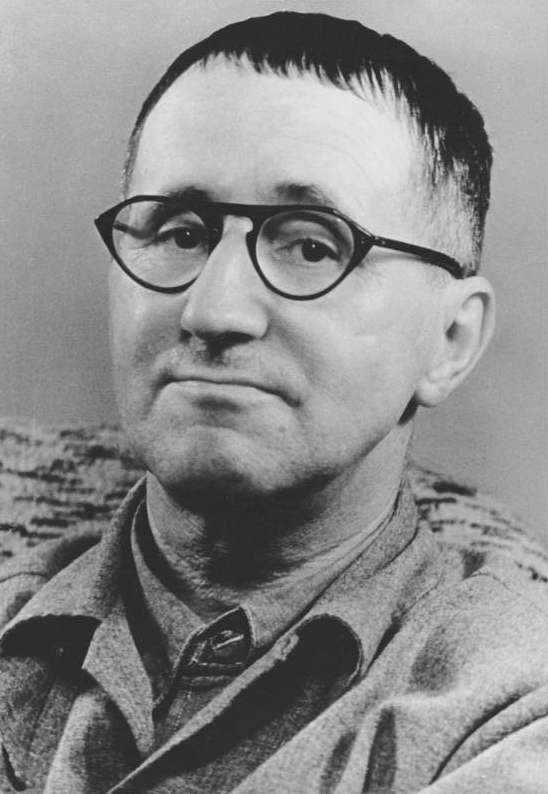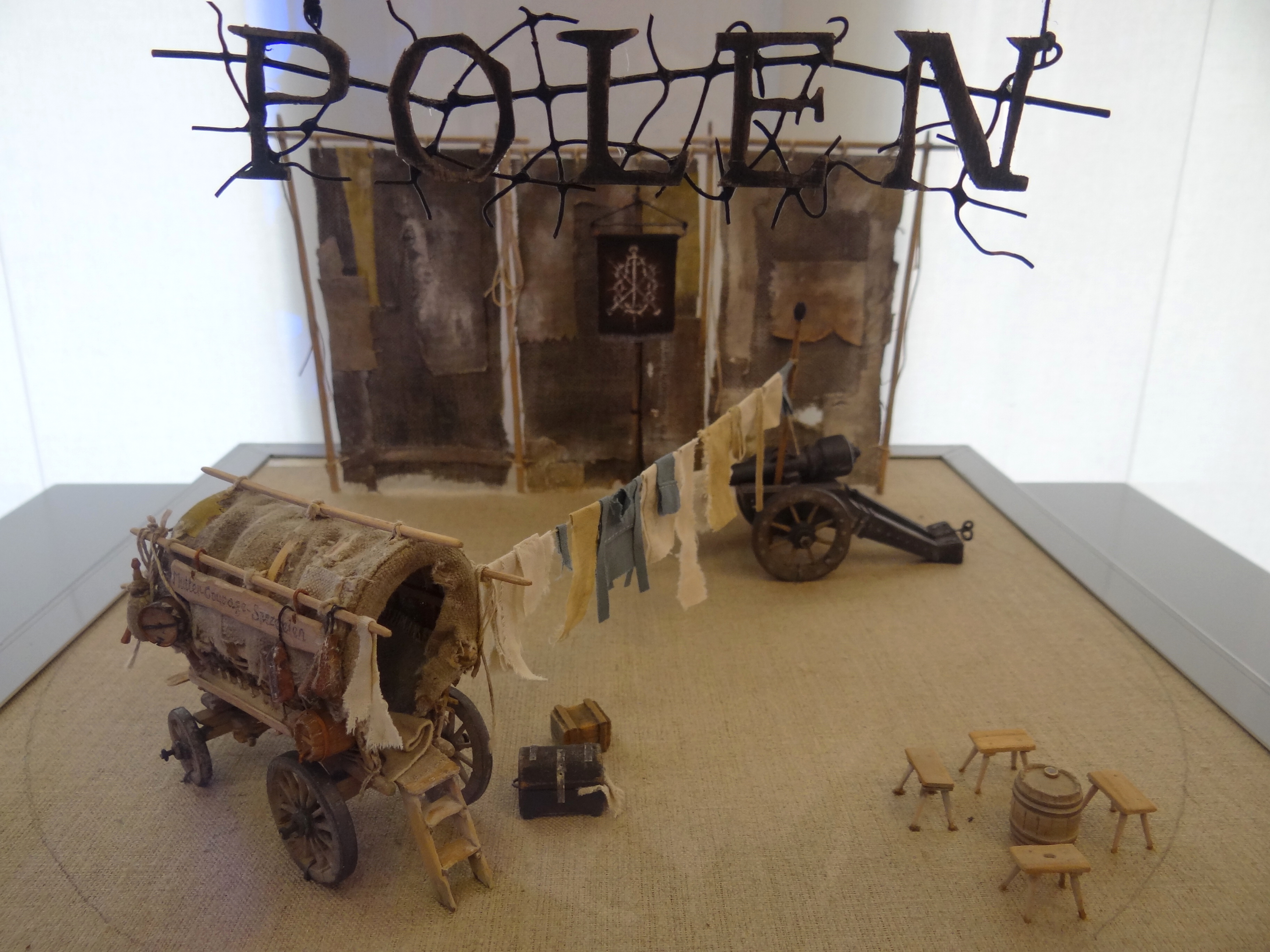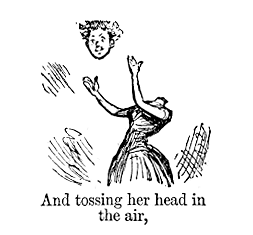|
Gestus
''Gestus'' (, from Latin meaning "gesture, attitude, carriage") is an acting technique developed by the German theatre practitioner Bertolt Brecht. It carries the sense of a combination of physical gestures and "gist" or attitude. It is a means by which "an attitude or single aspect of an attitude" is revealed, insofar as it is "expressible in words or actions."Willett (1964, 42). ''Gestus'', as the embodiment of an attitude, carries at least two distinct meanings in Brecht's theatre: first, the uncovering or revealing of the motivations and transactions that underpin a dramatic exchange between the characters; and second, the " epic" narration of that character by the actor (whether explicitly or implicitly). In the first sense, that of anatomizing the character, a ''Gestus'' reveals a specific ''aspect'' of a character: rather than his metaphysical, subconscious or other psychological dimensions, a ''Gestus'' makes visible a character's social relations and the causality of his ... [...More Info...] [...Related Items...] OR: [Wikipedia] [Google] [Baidu] |
Epic Theatre
Epic theatre (german: episches Theater) is a theatrical movement arising in the early to mid-20th century from the theories and practice of a number of theatre practitioners who responded to the political climate of the time through the creation of new political dramas. Epic theatre is not meant to refer to the scale or the scope of the work, but rather to the form that it takes. Epic theatre emphasizes the audience's perspective and reaction to the piece through a variety of techniques that deliberately cause them to individually engage in a different way. The purpose of epic theatre is not to encourage an audience to suspend their disbelief, but rather to force them to see their world as it is. History The term " epic theatre" comes from Erwin Piscator who coined it during his first year as director of Berlin's Volksbühne (1924–27).Wiles (1980). Piscator aimed to encourage playwrights to address issues related to "contemporary existence." This new subject matter would ... [...More Info...] [...Related Items...] OR: [Wikipedia] [Google] [Baidu] |
Latin
Latin (, or , ) is a classical language belonging to the Italic branch of the Indo-European languages. Latin was originally a dialect spoken in the lower Tiber area (then known as Latium) around present-day Rome, but through the power of the Roman Republic it became the dominant language in the Italian region and subsequently throughout the Roman Empire. Even after the fall of Western Rome, Latin remained the common language of international communication, science, scholarship and academia in Europe until well into the 18th century, when other regional vernaculars (including its own descendants, the Romance languages) supplanted it in common academic and political usage, and it eventually became a dead language in the modern linguistic definition. Latin is a highly inflected language, with three distinct genders (masculine, feminine, and neuter), six or seven noun cases (nominative, accusative, genitive, dative, ablative, and vocative), five declensions, four verb conjuga ... [...More Info...] [...Related Items...] OR: [Wikipedia] [Google] [Baidu] |
A Short Organum For The Theatre
"A Short Organum for the Theatre" ("Kleines Organon für das Theater") is a theoretical work by the twentieth-century German theatre practitioner Bertolt Brecht.Brecht, Bertolt. 1949. "A Short Organum for the Theatre". ''Brecht on Theatre: The Development of an Aesthetic.'' Ed. and trans. John Willett. London: Methuen, 1964. . pp. 179–205. It was written while in Switzerland in 1948 and published in 1949.Willett, John. 1964. "Note". In ''Brecht on Theatre: The Development of an Aesthetic'' by Bertolt Brecht. London: Methuen, 1964. . p.205. In a diary note from the time he refers to it as a "short condensation of the 'Messingkauf'"; when it was re-published in 1953 he identified it as a "description of a theatre of the scientific age"; later still he augmented it with some appendices and linked it to his notes for a " dialectical theatre". Against ''Poetics'' Returning in the history of theater to the ''Poetics'' of Aristotle and taking as an example ancient tragedies and comedie ... [...More Info...] [...Related Items...] OR: [Wikipedia] [Google] [Baidu] |
John Willett
John William Mills Willett, MBE (24 June 1917 – 20 August 2002) was a British translator and a scholar who is remembered for translating the work of Bertolt Brecht into English. Early life Willett was born in Hampstead and was educated at Winchester and Christ Church, Oxford. He went on to the Manchester College of Art and Dance, and then to Vienna, where he studied music (Willett played the cello) and stage design. Willett began his career as a theatre designer. However, this career was cut short by World War II. He served in Intelligence and the Eighth Army, in North Africa and Italy. Beginning his war in July 1940 as a second lieutenant in the British Army, he ended it just over five years later as a lieutenant colonel. In August 1942 he was transferred to the Intelligence Corps, in April 1944 he was mentioned in dispatches and in June 1945 he was made an Member of the Order of the British Empire (MBE). After being demobilised, Willett worked first for the ''Manche ... [...More Info...] [...Related Items...] OR: [Wikipedia] [Google] [Baidu] |
Distancing Effect
The distancing effect, also translated as alienation effect (german: Verfremdungseffekt or ''V-Effekt''), is a concept in performing arts credited to German playwright Bertolt Brecht. Brecht first used the term in his essay "Alienation Effects in Chinese Acting" published in 1936, in which he described it as performing "in such a way that the audience was hindered from simply identifying itself with the characters in the play. Acceptance or rejection of their actions and utterances was meant to take place on a conscious plane, instead of, as hitherto, in the audience's subconscious". Origin The term ''Verfremdungseffekt'' is rooted in the Russian Formalist notion of the device of ''making strange'' (приём отстранения ''priyom otstraneniya''), which literary critic Viktor Shklovsky claims is the essence of all art. Lemon and Reis's 1965 English translation of Shklovsky's 1917 coinage as "defamiliarization", combined with John Willett's 1964 translation of Brecht' ... [...More Info...] [...Related Items...] OR: [Wikipedia] [Google] [Baidu] |
Empathy
Empathy is the capacity to understand or feel what another person is experiencing from within their frame of reference, that is, the capacity to place oneself in another's position. Definitions of empathy encompass a broad range of social, cognitive, and emotional processes primarily concerned with understanding others (and others' emotions in particular). Types of empathy include cognitive empathy, emotional (or affective) empathy, somatic empathy, and spiritual empathy.Rothschild, B. (with Rand, M. L.). (2006). ''Help for the Helper: The psychophysiology of compassion fatigue and vicarious trauma''. Etymology The English word ''empathy'' is derived from the Ancient Greek (''empatheia'', meaning "physical affection or passion"). That word derives from (''en'', "in, at") and ('' pathos'', "passion" or "suffering"). Theodor Lipps adapted the German aesthetic term ("feeling into") to psychology in 1903, and Edward B. Titchener translated into English as "empathy" i ... [...More Info...] [...Related Items...] OR: [Wikipedia] [Google] [Baidu] |
Berliner Ensemble
The Berliner Ensemble () is a German theatre company established by actress Helene Weigel and her husband, playwright Bertolt Brecht, in January 1949 in East Berlin. In the time after Brecht's exile, the company first worked at Wolfgang Langhoff's Deutsches Theater and in 1954 moved to the Theater am Schiffbauerdamm, built in 1892, that was open for the 1928 premiere of ''The Threepenny Opera'' (''Die Dreigroschenoper''). Bertolt Brecht's Berliner Ensemble Brecht's students Benno Besson, Egon Monk, Peter Palitzsch, and Manfred Wekwerth were given the opportunity to direct plays by Brecht that had not yet been staged. The stage designers Caspar Neher and Karl von Appen, the composers Paul Dessau and Hanns Eisler, as well as the dramaturge Elisabeth Hauptmann, were among Brecht's closest collaborators. After her husband died in 1956, Weigel continued managing the Berliner Ensemble until her death in 1971. The Berliner Ensemble achieved success through long and meticulous rehears ... [...More Info...] [...Related Items...] OR: [Wikipedia] [Google] [Baidu] |
Heiner Müller
Heiner Müller (; 9 January 1929 – 30 December 1995) was a German (formerly East German) dramatist, poet, writer, essayist and theatre director. His "enigmatic, fragmentary pieces" are a significant contribution to postmodern drama and postdramatic theatre."With Beckett's death Müller becomes the theatre's greatest living poet." ''The Village Voice'', quoted on the backcover of Müller's ''Theatremachine'' (1995). The phrase "enigmatic and fragmentary pieces" comes from the article on Müller in ''The Cambridge Guide to Theatre'' (Banham 1995, 765). Among others, Elizabeth Wright assesses Müller's contribution to a postmodern drama in ''Postmodern Brecht'' (1989). Biography Müller was born in Eppendorf, Saxony. He joined the Social Democratic Party of Germany in 1946 which was in the course of the forced merger of the KPD and SPD subsumed into the Socialist Unity Party of Germany (Sozialistische Einheitspartei Deutschlands, SED). He was soon expelled for lacking enthusiasm ... [...More Info...] [...Related Items...] OR: [Wikipedia] [Google] [Baidu] |
Cliché
A cliché ( or ) is an element of an artistic work, saying, or idea that has become overused to the point of losing its original meaning or effect, even to the point of being weird or irritating, especially when at some earlier time it was considered meaningful or novel. In phraseology, the term has taken on a more technical meaning, referring to an expression imposed by conventionalized linguistic usage. The term is often used in modern culture for an action or idea that is expected or predictable, based on a prior event. Typically pejorative, "clichés" may or may not be true. Some are stereotypes, but some are simply truisms and facts. Clichés often are employed for comedic effect, typically in fiction. Most phrases now considered clichéd originally were regarded as striking but have lost their force through overuse. The French poet Gérard de Nerval once said, "The first man who compared woman to a rose was a poet, the second, an imbecile." A cliché is often a vivid d ... [...More Info...] [...Related Items...] OR: [Wikipedia] [Google] [Baidu] |
Fabel
A ''Fabel'' is a critical analysis of the plot of a play. It is a dramaturgical technique that was pioneered by Bertolt Brecht, a 20th century German theatre practitioner . ''Fabel'' should not be confused with 'fable', which is a form of short narrative (hence the retention of the original German spelling in its adoption into English usage). Elizabeth Wright argues that it is "a term of art which cannot be adequately translated".Wright, Elizabeth. 1989. ''Postmodern Brecht: A Re-Presentation''. Critics of the Twentieth Century Ser. London and New York: Routledge. . p.28. A critical term As a critical term, a fabel includes three interrelated but distinct aspects: firstly, an analysis of the events portrayed in the story. In an epic production, this analysis would focus on the social interactions between the characters and the causality of their behaviour from a historical materialist perspective; the ''fabel'' summarizes "the moral of the story not in a merely ethical sense, b ... [...More Info...] [...Related Items...] OR: [Wikipedia] [Google] [Baidu] |
Historical Materialism
Historical materialism is the term used to describe Karl Marx's theory of history. Marx locates historical change in the rise of class societies and the way humans labor together to make their livelihoods. For Marx and his lifetime collaborator, Friedrich Engels, the ultimate cause and moving power of historical events are to be found in the economic development of society and the social and political upheavals wrought by changes to the mode of production. Historical materialism provides a challenge to the view that historical processes have come to a close and that capitalism is the end of history. Although Marx never brought together a formal or comprehensive description of historical materialism in one published work, his key ideas are woven into a variety of works from the 1840s onward. Since Marx's time, the theory has been modified and expanded. It now has many Marxist and non-Marxist variants. Enlightenment views of history Marx's view of history is shaped by his enga ... [...More Info...] [...Related Items...] OR: [Wikipedia] [Google] [Baidu] |
Germans
, native_name_lang = de , region1 = , pop1 = 72,650,269 , region2 = , pop2 = 534,000 , region3 = , pop3 = 157,000 3,322,405 , region4 = , pop4 = 21,000 3,000,000 , region5 = , pop5 = 125,000 982,226 , region6 = , pop6 = 900,000 , region7 = , pop7 = 142,000 840,000 , region8 = , pop8 = 9,000 500,000 , region9 = , pop9 = 357,000 , region10 = , pop10 = 310,000 , region11 = , pop11 = 36,000 250,000 , region12 = , pop12 = 25,000 200,000 , region13 = , pop13 = 233,000 , region14 = , pop14 = 211,000 , region15 = , pop15 = 203,000 , region16 = , pop16 = 201,000 , region17 = , pop17 = 101,000 148,00 ... [...More Info...] [...Related Items...] OR: [Wikipedia] [Google] [Baidu] |



_2.jpg)



